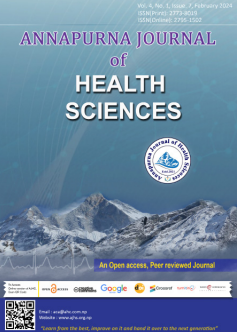Herbal Medicine Associated Casualty And Fatality In South West Nigeria: A Retrospective Analysis
Keywords:
Casualty, Fatality, Herbal medicines, Primary Health CareAbstract
Introduction: Several studies have indicated that use of herbal medicines (HMs) in Nigeria and other parts of the world may harm human health. Contamination, adulteration, and the likely presence of toxic constituents in HMs have raised serious concerns regarding their safety. As a result, hospital records in Ekiti state, Nigeria, were analyzed to determine the extent to which HMs contribute to the number of hospital admissions (casualties) and deaths (fatalities) in the area.
Methods: A 5-year (2010 to 2014) retrospective analysis of patient data was carried out by examining HM-associated paediatric, adult medical, and obstetric casualty and fatality figures. The findings were then triangulated with available secondary data.
Results: During the studied period, out of 23,363 pediatric cases, 0.5% of casualties and 3.2% of fatalities were associated with HM use. Similarly, among 52,871 adult cases, 0.06% of casualties and 0.2% of fatalities were linked to HM use. Of the 668 obstetric stillbirth cases, 3.9% involved the use of HM. The highest number of casualties and fatalities were observed in male patients aged between 30 to 49 years, who were Christians and self-employed.
Conclusion: While the number of deaths associated with HM is relatively low, the possible complications that can arise from its use make it necessary to test and promote awareness of possible dangers of HM use to prevent hospitalizations and fatalities. Better awareness and documentation of patients' HM use by healthcare providers will help gain a better insight into their usage.
Downloads
Downloads
Published
How to Cite
Issue
Section
License

This work is licensed under a Creative Commons Attribution 4.0 International License.
This license allows reusers to distribute, remix, adapt, and build upon the material in any medium or format, so long as attribution is given to the creator. The license allows for commercial use.




